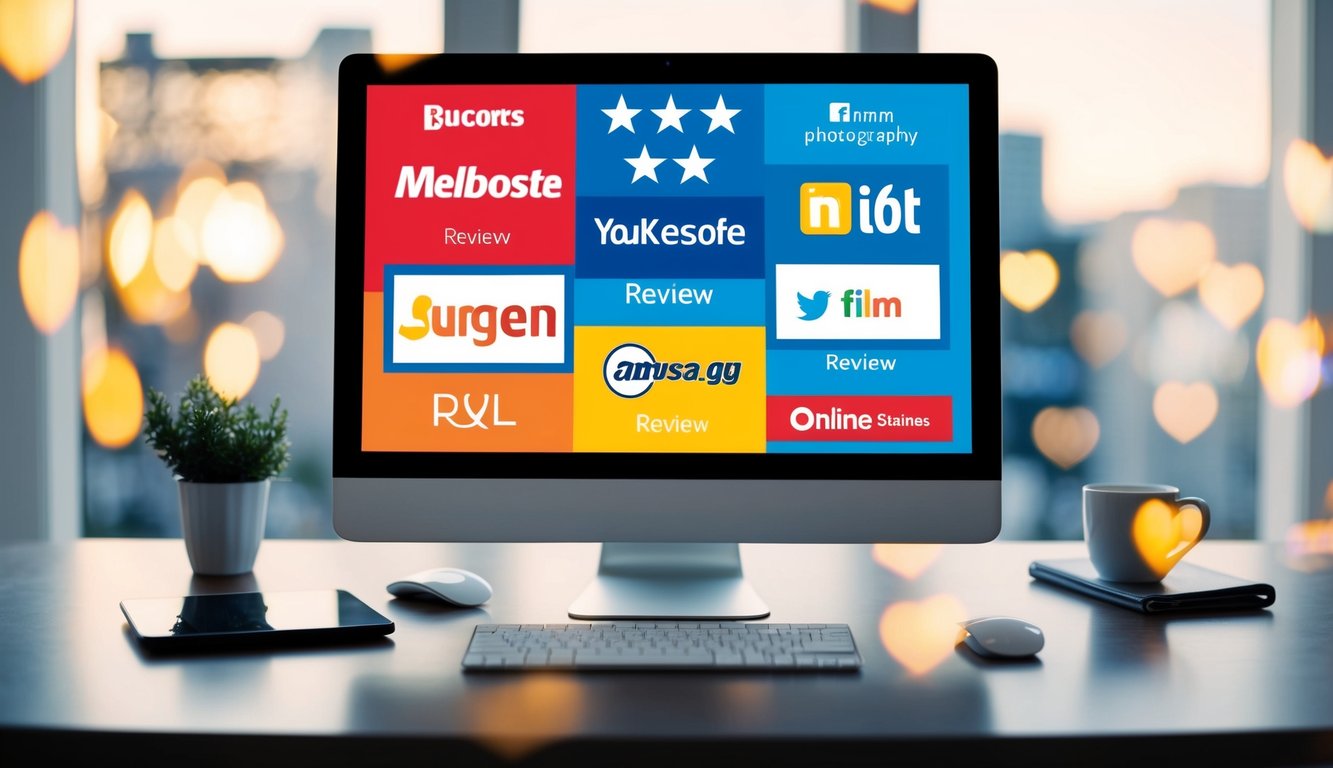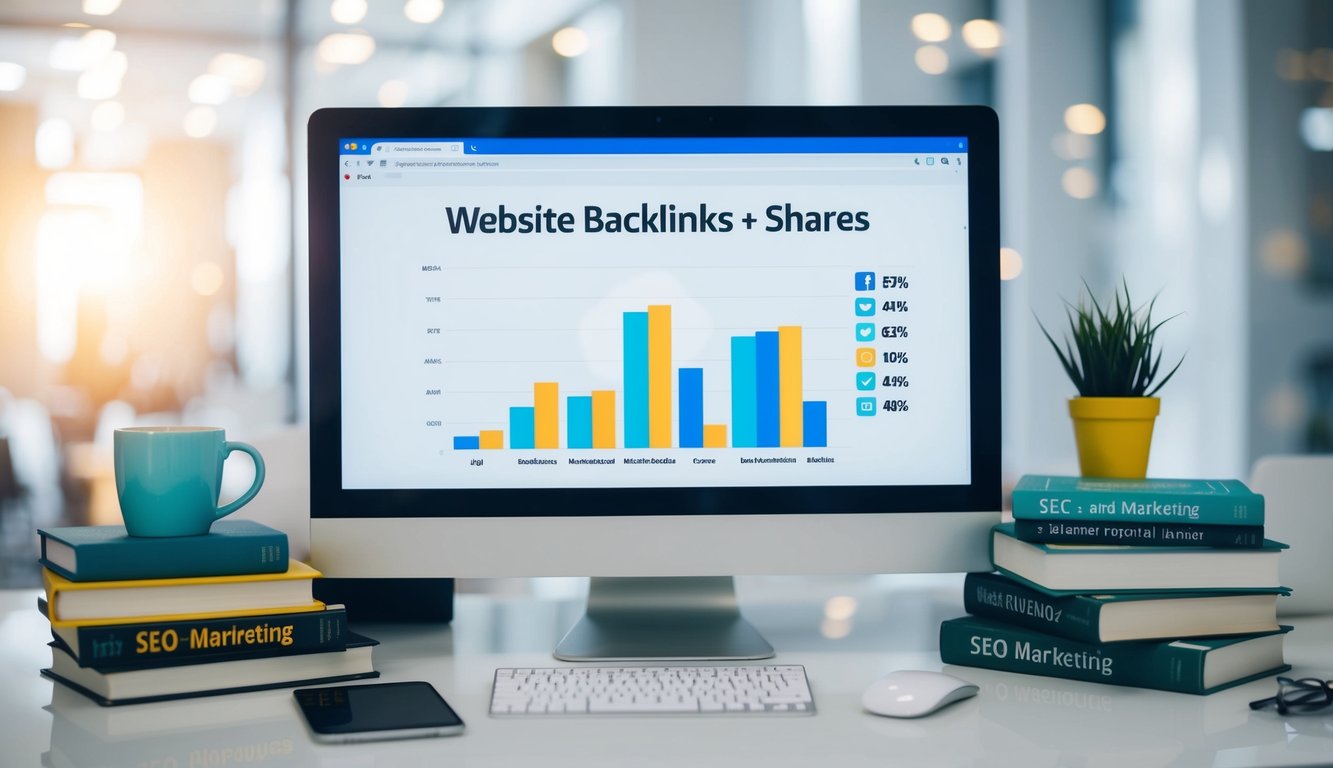A Comprehensive Guide to Off-Page SEO: Building Authority and Trust
In the vast and sometimes baffling universe of SEO, on-page optimization gets a lot of attention, leaving off-page SEO to play the misunderstood sibling.
Off-page SEO is your ticket to boosting your website’s authority and trustworthiness, making search engines—and users—flock to you like bees to honey.
Forget about keyword stuffing and meta tags for a moment, and let’s dive into the more exciting world of building links, leveraging social signals, and harnessing the power of brand mentions.

Imagine your site as the new kid in town who needs to build a reputation; off-page SEO is like a hearty handshake with influential players in your field.
By perfecting your off-page SEO strategy, you’re essentially shouting from the digital rooftops that your site is worthy of attention. This isn’t just about who you know but how you’re perceived across the web’s vast social playground.
Getting people to link back to your site isn’t about begging for a vote—it’s about joining a digital clique that makes your site the cool kid on the search engine block!
Speaking of that, ever wonder what impact those tiny social media shares and content collaborations can have?
They’re the whispers in the digital alleyways that build your site’s credibility.
If you’re ready to take your off-page game to the next level, stay tuned as we break down actionable strategies to win your web-wide popularity contest.
Key Takeaways
- Off-page SEO builds authority and credibility for your website.
- Effective link building and social signals boost search engine rankings.
- Monitoring brand mentions enhances online reputation and trust.
Understanding Off-Page SEO
When it comes to off-page SEO, the digital world is your playground. It’s about crafting a parallel universe where your website isn’t confined to its hosting server. Venture out, and discover how authority and trust bloom in the digital realm.
The Importance of Off-Page SEO
Think of off-page SEO as the popular kid in school who’s never at their desk. It influences search engine rankings by building a reputation beyond your website’s boundaries.
Search engines give brownie points to pages that are loved and trusted by others, and this isn’t just because they have a killer smile or the latest sneakers. It’s because they’re backed by authority and solid references from other domains.
Unlike on-page SEO, here you focus on inbound links, brand mentions, and social endorsements. These external signals tell search engines that your website is relevant and worthy of higher visibility.
Key Components of Off-Page SEO
Backlinks are the bread and butter of off-page SEO. They’re the real MVPs, vouching for your website like a reputable job reference.
Not all links are created equal, though. High-quality links from credible sites elevate your status more than a thousand shaky ones.
Social media marketing chips in by fostering engagement and spreading the word about your brand. You’d be hard-pressed to ignore brand mentions too. Even if they don’t link directly, they still whisper sweet nothings into Google’s ear about your site’s relevance.
Don’t forget online reviews and forums, where the chatter can sway user perception. A glowing review isn’t just a pat on the back; it’s a digital stamp of approval.
Link Building Techniques
Mastering link building can elevate your website’s authority and improve search engine rankings. This section covers critical tactics for acquiring valuable links. It’s not just about quantity but quality and strategic placement. Understanding these methods can make a noticeable difference in your online presence.
The Role of Backlinks in SEO
Imagine backlinks as votes of confidence for your website. The more high-quality votes you receive, the more credible your site becomes in the eyes of search engines.
Backlinks help search engines understand the popularity and relevance of your content. Not all backlinks are created equal, though. A link from a reputable news site is far more valuable than dozens from lesser-known blogs.
Focus on quality over quantity, and remember that a single authoritative link can outweigh many poor ones. Keep in mind that search engines value diversity. Links from a variety of domains are more beneficial than multiple links from the same site. So, aim to gather a broad range of links.
Strategies for Acquiring High-Quality Backlinks
Securing high-quality backlinks involves more than sending random emails to webmasters. It requires targeted research to identify potential linking partners.
Start with competitive analysis: scrutinize where competitors get their backlinks. This not only reveals industry standards but unearths link opportunities.
Content is still king. Creating valuable, shareable content naturally attracts links. Interactive content like infographics or tools can draw positive feedback.
Remember, reciprocal linking isn’t as effective as it once was. Instead, focus on content partnerships or collaborations. Lastly, ensure your content is link-worthy, addressing pain points or offering a fresh perspective.
Guest Blogging and Outreach
Don’t underestimate guest blogging’s power when done right. Find bloggers who complement your niche and offer to contribute high-quality articles.
Your content should provide genuine value rather than simply promoting your site. Choose blogs with engaged audiences where your expertise can shine.
Outreach demands both effort and tact. Personalize your messages—generic pitches often end up in the spam folder.
Make sure to emphasize the mutual benefits of collaboration. Showcase previous successful guest posts and include relevant credentials. When pitching, clarity and brevity are key. Bloggers appreciate someone who gets to the point but also understands their audience.
Broken Link Building
Broken link building is your chance to be the hero of the story. Find broken links on relevant sites and suggest your content as a replacement.
Tools like Ahrefs or SEMrush are fantastic for hunting down these opportunities, where you fix their problem and gain a backlink in return.
Start by identifying resource pages with outdated links. Contact the webmaster and mention the broken links you’ve found. This not only helps them improve their content, but it also provides an avenue for your link. This method requires patience and perseverance but can provide excellent results when executed effectively.
Leveraging Influencer Partnerships
Partnering with influencers can add both relevance and authority to your link building efforts.
Identify influencers whose audience aligns with yours, and approach them with a proposal that benefits both parties. This could be a product review, a joint venture, or an affiliate agreement.
Ensure authenticity. Influencer partnerships should appear natural, not forced. Influence extends beyond social media—consider journalists, researchers, or other industry professionals.
Collaboration should be genuine, and align with both your and the influencer’s brand. This approach can build meaningful connections and result in valuable backlinks that legitimize your brand.
Social Signals and Their Impact
Are social signals a magic bullet for SEO success? Not quite, but ignoring them is like driving without a seatbelt. Social signals such as likes, shares, and comments can enhance your brand’s visibility and indirectly influence your site’s search engine rankings.
Understanding Social Signals
Social signals are those delightful digital nods—likes, shares, and comments—that indicate your content is winning in the eyes of the audience. These engagements contribute to your content’s visibility and relevance as perceived by search engines.
Though not a direct ranking factor, these indicators reflect content quality and relevance, as noted in strategies for boosting SEO with social signals. Consider them the whispers in Google’s ear, hinting that your content deserves attention. It’s the engagement fairy dust that helps web pages sparkle a bit more in search results.
How Social Media Influences SEO
Social media’s influence on SEO isn’t about direct causation but more about correlation. For example, off-page SEO strategies emphasize that increased social media engagement bolsters visibility, leading to higher chances that your content gets linked by other websites.
Social media plays a role by driving traffic, enhancing brand recognition, and providing platforms for content sharing. It’s like planting seeds in a garden; the more you engage, the more likely your content grows roots in Google’s algorithm, leading to more organic traffic through shares that eventually lead to valuable backlinks.
Best Practices for Social Media Engagement
First off, nail down a consistent content schedule. Consistency builds trust and engagement.
Next, create content that encourages interaction. Ask questions, run polls, or host live sessions. Share different content types—videos, infographics, articles—to engage different audience segments.
Also, don’t forget to register your business on various social media platforms.
Finally, engage actively with your audience; prompt responses and genuine interactions can elevate your brand’s social presence.
Treat social media platforms as extensions of your brand, not just broadcast channels. Engage authentically, and watch how your social signals work in tandem with SEO efforts.
Content Marketing for Off-Page SEO

In the competitive world of SEO, your content isn’t just another blog post—it’s your secret weapon for building authority and trust. Focus on crafting content that’s irresistible to share, mastering distribution, engaging users, and leveraging their contributions.
Creating Shareable Content
Creating content that screams to be shared is your golden ticket. It’s not just about slapping words onto a page; it’s about crafting something people can’t resist showing off.
Start with a gripping story or an eye-catching infographic. Visual elements like infographics can increase shares. Numbers and data? They’re your best friends. Harness their power with lists and case studies.
Want it to stick? Make it actionable and useful. Don’t just inform; enlighten. That aha moment? It’s everything. It makes your audience not just consumers, but ambassadors for your content.
Remember, if it’s not shareable, why bother?
Content Distribution Strategies
Once you’ve got that killer content, it’s time to get the word out like your life depends on it.
Leveraging platforms is key—LinkedIn for professionals, Instagram for the visual crowd, and so on. Consider partnerships or collaborations with industry influencers to give content a rocket boost.
Email newsletters can subtly slide your content right into someone’s inbox, ensuring they don’t miss out. Paid promotions? If you’ve got the budget, they’re not evil. They can amplify reach, but do it smartly. You want eyes and engagement, not just a fleeting glance.
Strategic distribution ensures your content lives, breathes, and thrives.
Utilizing Content Syndication
Content syndication may sound like the dark arts, but trust me, it’s legit. Rest assured, it’s not the bogeyman of duplicate content.
When used right, syndication gets your work on high-traffic platforms, expanding your reach with minimal effort. Platforms like Medium or GrowthHackers are your new best pals.
You’ll want to maintain your canonical tags—so Google knows who the real MVP is. Don’t overdo it. Prefer quality sites over quantity. Syndication is about spreading influence, not spamming the web.
The Power of User-Generated Content
User-generated content? That’s the holy grail. It’s organic, credible, and requires zero effort from you.
When your audience starts creating and sharing their spin on your brand, you’re onto something special. Encourage reviews, host contests, or simply ask questions. Platforms like TikTok and Instagram thrive on this engagement.
Showcase testimonials or feature user-created visuals on your channels. It’s about building community and letting your audience speak for you. When users create, others pay attention. This isn’t just content—it’s your content army.
Brand Mentions and Online Reputation

To build authority and trust online, your brand needs to be more than just a website or a product. It’s about becoming a recognized conversation starter in your industry. This means leveraging brand mentions effectively and keeping an eagle eye on your online reputation.
The Significance of Brand Mentions
Picture this: your brand is making waves and everyone’s talking about it. Each mention acts like a virtual nod of approval.
Besides boosting your reputation, brand mentions aid in SEO by signaling to search engines that you’re a key player. They enhance SEO through structured data and unstructured mentions alike.
Imagine each mention as a breadcrumb leading potential customers back to your doorstep. Owning these mentions can differentiate you from competitors and build trust with your audience.
The more your brand is mentioned, the more likely it will be associated with authority in your niche. It’s like leaving digital fingerprints all over the internet, making sure your brand is never out of sight or mind.
Monitoring and Managing Online Reputation
Think of managing your online reputation as maintaining your digital garden. Neglect it, and it becomes a jungle of misinformation and negativity.
Keeping tabs on what’s being said about your brand can not only defuse potential public relations disasters but can also inform your strategic moves.
Engage with feedback—positive or negative—like you would with a grumpy neighbor. It’s often not only what’s being said but how you respond that matters.
A timely and well-crafted response can turn detractors into advocates. A proactive approach involves not just damage control, but also amplifying positive stories and customer experiences.
Remember, silence is golden; but in online reputation management, silence is suspicious.
Tools for Tracking Brand Mentions
Welcome to the digital world’s secret weapon: tracking tools. Tools like Google Alerts, Mention, or Brand24 act like your savvy digital assistants.
They notify you any time your brand is whispered or shouted across the web. Think of them as the room monitor you never knew you needed.
These tools offer features like sentiment analysis, helping you understand not just what is being said, but the tone. They track conversation threads, enabling you to jump in at just the right moment to steer the conversation.
Investing in such tools is like investing in peace of mind, allowing you to sleep better knowing your brand’s reputation is under control.
Measuring Off-Page SEO Success

You’ve put in the hard work with off-page SEO; now, how do you know if it’s paying off? It’s all about keeping an eye on critical metrics, using the right tools, and adapting strategies as needed.
Ready to dive into the nitty-gritty details and get your website roaring to the top?
Key Metrics to Track
Before you start blindly tracking numbers, let’s get smart about the ones that matter.
Backlink Quantity and Quality are top contenders. Not all backlinks are created equal; focus on getting links from authoritative sites—not just any blog that’ll have you.
Domain Authority (DA): Yes, this beautiful number might just become your best frenemy—providing insight into your site’s credibility. Keep a close eye on Referral Traffic too—it’s the hidden gem that tells you which links are sending actual humans your way.
Social Signals: Think likes and shares are vanity metrics? Think again. They can serve as a secondary indicator of your site’s reach and engagement. Who would’ve thought you’d have to care about these numbers after high school?
Tools for Measuring Off-Page SEO Performance
Diving into the world of SEO tools could be your next favorite digital adventure.
Start with Google Analytics for a deep dive into referral traffic data. This trusty tool gives you insights into which backlinks bring visitors to your site.
Ahrefs and Moz are popular choices for tracking both backlink profiles and domain authority. Ahrefs offers a comprehensive look at your backlinks, identifying potential opportunities and toxic links lurking in the dark corners of the web.
BuzzSumo can make you a social engagement wizard by analyzing which content types draw the most attention. Want to know if your content is crushing it or crashing it? BuzzSumo has the crystal ball you’ve been missing.
Analyzing and Adapting Strategies
Metrics and tools are fantastic, but don’t celebrate too soon. Analyze the data you collect and focus on strategy adaptation.
Spotting trends is key, and small changes can lead to substantial results.
Consider refining your link-building tactics—perhaps by targeting more niche sites if broader ones aren’t working. If social engagement is falling flat, rethink your content strategy to resonate better with your audience.
The point is, don’t let numbers gather dust. Adapt, prosper, and watch your domain authority rise like a well-baked soufflé. You’re aiming for a well-rounded off-page SEO strategy that grows and evolves with the digital world.
Conclusion

So, you’ve waded through this off-page SEO journey, bravely tackling the beast of building authority and trust.
Pat yourself on the back. Everyone loves talking about on-page SEO, but off-page is where the real power move happens.
Think bigger than keywords. It’s like the difference between talking about making a cake and actually baking it.
Quality backlinks and strong social signals? They’re your cake tiers.
Key Takeaways:
- Backlinks: Your charming little connectors that shout “trust me!” to search engines.
- Guest Posting: It’s like crashing someone else’s party but leaving everyone thrilled you came.
- Social Media: Because who doesn’t love a good meme mixed with high authority marketing?
Remember, off-page SEO is not a sprint; it’s a marathon. Get comfy with the idea of playing the long game.
Keep massaging those digital connections, nurturing relationships, and watch your site grow like a well-fed plant.
Now, go out there and dangle your website in front of those search engine gods like the tempting SEO treat it is.
Because why settle for being a digital wallflower when you can be the influencer of your niche?